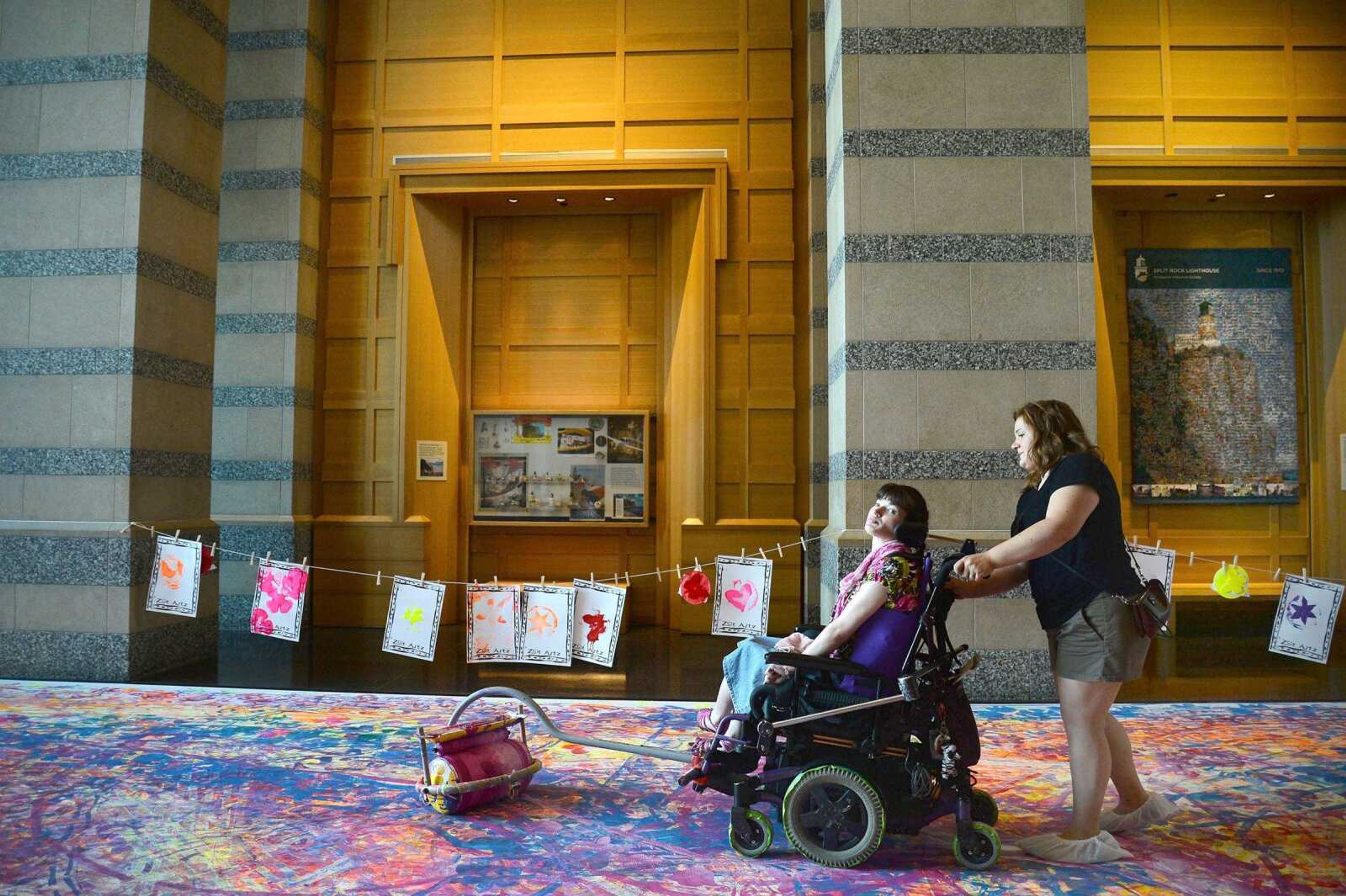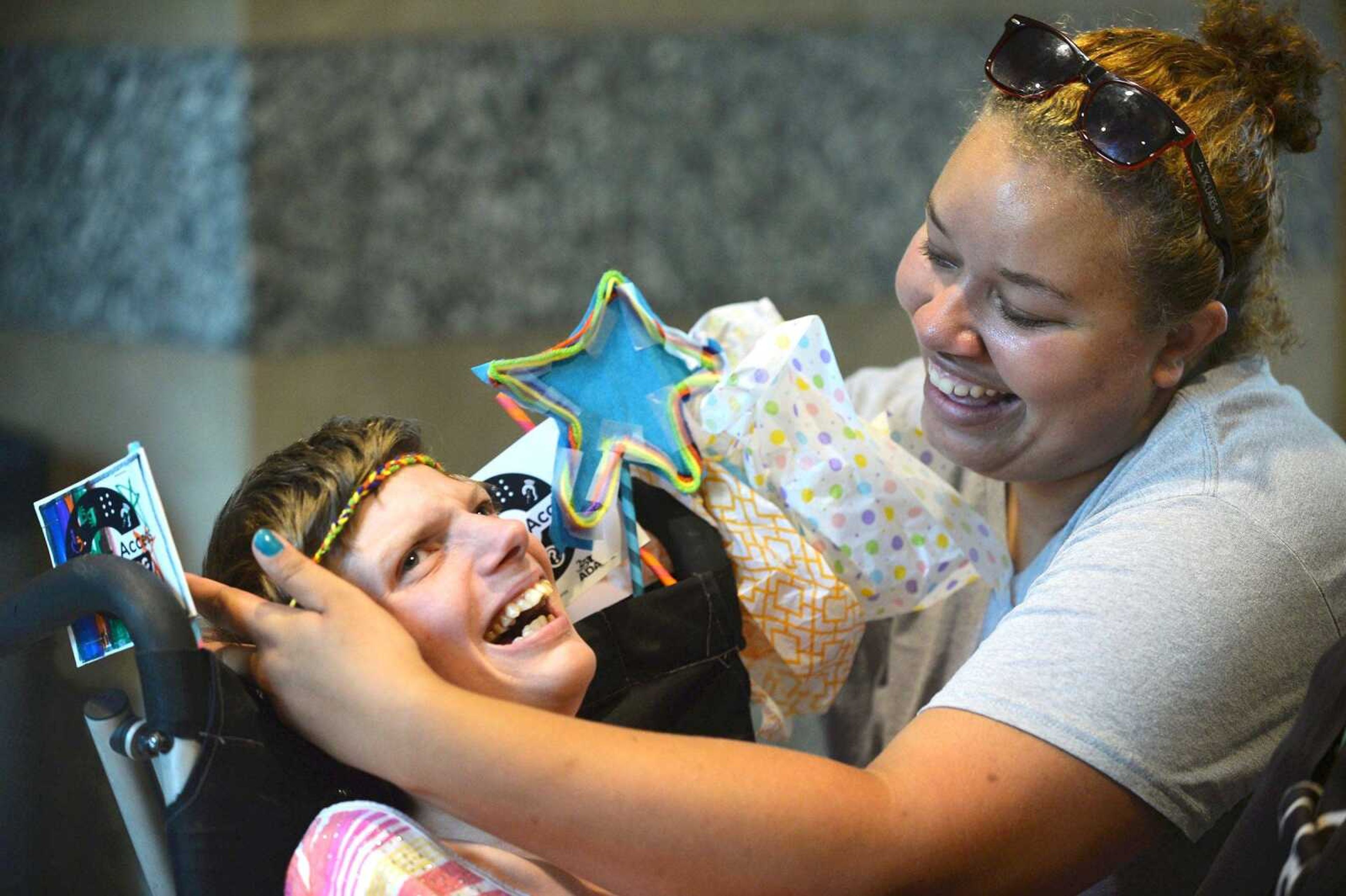Americans with Disabilities Act marks first quarter-century
It has been 25 years since the passage of the Americans with Disabilities Act, and while advancements have been made over the years, some say there still is room for improvement moving forward. Miki Gudermuth, founder and executive director of SEMO Alliance for Disability Independence in Cape Girardeau, said the ADA has increased accessibility to places such as grocery stores, schools and restaurants...
It has been 25 years since the passage of the Americans with Disabilities Act, and while advancements have been made over the years, some say there still is room for improvement moving forward.
Miki Gudermuth, founder and executive director of SEMO Alliance for Disability Independence in Cape Girardeau, said the ADA has increased accessibility to places such as grocery stores, schools and restaurants.
Gudermuth contracted polio when she was 9 months old, during the summer epidemic of 1949.
She underwent several operations at Shriners Hospital to remove the long leg braces, only to go back into one in 1982. She uses crutches for short distances and a wheelchair.
"It used to be the shopping malls were the only places you could go for access, because everything was on one level. It just was easier," she said. "The mandate for curb cuts in downtown areas has made it easier to go to some of the older shops that exist in downtown areas. That was great for me."

Sunday marked the 25th anniversary of the ADA, which was signed into law July 26, 1990, by President George H.W. Bush.
The act prohibits discrimination and guarantees people with disabilities have the same opportunities as everyone else to participate in the "mainstream of American life" -- to enjoy employment opportunities, buy goods and services and participate in state and local government programs and services, according to ADA.gov.
Modeled after the Civil Rights Act of 1964 that prohibits discrimination on the basis of race, color, religion, sex, or national origin -- and Section 504 of the Rehabilitation Act of 1973 -- the ADA is an equal-opportunity law for people with disabilities.
To be protected by the ADA, the person must have a disability defined by the ADA as a physical or mental impairment that substantially limits one or more major life activities or a history or record of such an impairment or be perceived by others as having such an impairment.
There still are barriers, however, especially for those who are deaf, Gudermuth said. She used as an example the situation when a person who is deaf goes to an emergency room.
A "reasonable accommodation" is a videophone that connects the person who is deaf with a translator, she said.
But the use of a videophone in an emergency medical situation is not always appropriate.
"If somebody's having a heart attack or stroke, now's not the time to try to get a videophone. In the rural community, it's very difficult to keep the connection. By the time you try to set up one, you're forcing someone's head to look up at a videophone next to the bed, and they're in pain," she said, adding the patient needs a translator who can talk in person.
But in other areas during the past 25 years, there have been positive changes, Gudermuth said.
"Since the ADA came on the scene, people are allowed to be integrated into society and into the mainstream schools," she said.
In a statement, Gov. Jay Nixon praised the ADA but acknowledged the need for improvements.
"We have come a long way in the past 25 years, here in Missouri and across the country, to take down barriers, physical and otherwise, that hindered individuals with disabilities from having an equal opportunity to pursue the American dream," Nixon said. "There is still more work to be done, but the progress that has been made in the past quarter-century demonstrates that the ADA deservedly takes its place with other landmark laws, such as the Civil Rights Act of 1964, in helping America achieve our cherished ideals of liberty and freedom for all."
U.S. Sen. Claire McCaskill of Missouri said in a news release the United States has been a global leader in ensuring equal treatment and access for those living with disabilities.
"And the Americans With Disabilities Act is the foundation of that leadership," McCaskill said. "The ADA established in law that a disability does not mean second-class citizenship. It remains critically important on this anniversary that we continue fighting for access, opportunity and equality for the tens of millions of Americans currently living with a disability."
Missouri Attorney General Chris Koster released a statement regarding the anniversary, saying the past 25 years have seen impressive progress for disability rights.
"But it is incumbent upon us all that we see these 25 years as only the beginning," Koster said. "For the more than one million Missourians living with disabilities, access to the basic elements of a self-reliant and publicly engaged life must not be dictated by circumstances of physical or mental disability. Our conversations about diversity should include our neighbors with disabilities and the perspectives they offer."
Gudermuth said she thinks the ADA, just like every other civil-rights act, is meant to make life better for everyone.
"The ADA was a great thing for us, and I'm grateful for it," she said. "But I think we do, especially in our town here, have pretty good people that really care about the people with disabilities.
"I've gone to visit a lot of communities, and when we moved here 33 years ago, I was impressed with how nice everyone was and how they tried to be accommodating where possible. You can't say that for everywhere, so I give kudos to Cape Girardeau and Jackson and some of the other small towns that have tried to make themselves more accessible."
klamb@semissourian.com
388-3639
Connect with the Southeast Missourian Newsroom:
For corrections to this story or other insights for the editor, click here. To submit a letter to the editor, click here. To learn about the Southeast Missourian’s AI Policy, click here.









